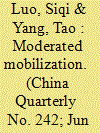| Srl | Item |
| 1 |
ID:
173855


|
|
|
|
|
| Summary/Abstract |
In response to a series of strikes in south China in 2010, a new model of collective bargaining has emerged, featuring what this article describes as “moderated mobilization.” Distinct from what is typically known as China's quadripartite industrial relations system, whereby workers are separated from the party-state, official trade unions and employers, this model shows workers and enterprise-level trade unions in collaboration with one another. According to our observations from 2012 to 2017, some enterprise unions have successfully mobilized workers throughout the collective bargaining process. These unions are democratically elected by workers and are relatively independent from the official authorities. At the same time, they have “moderated” such mobilization particularly to reduce labour militancy, given the political and institutional constraints within which they must work. The implication of this new model is significant. Although it might be far from solving the quadripartite dilemma, it has signalled an increase in local initiatives among enterprise unions – a previously neglected but pragmatically favourable channel for workers.
|
|
|
|
|
|
|
|
|
|
|
|
|
|
|
|
| 2 |
ID:
170983


|
|
|
|
|
| Summary/Abstract |
This article examines the relations between official trade unions and labor NGOs in South China. Previous studies on Chinese labor NGOs have focused on their roles in empowering workers (optimistic vs. pessimistic views) and the strategies of the party-state to deal with them (exclusion and incorporation), but one important point has been missing from the literature: the pressure labor NGOs place on the All-China Federation of Trade Unions (ACFTU) to reform itself. Based on two case studies of local trade union innovation projects in South China, this article demonstrates how the local branches of the ACFTU have innovated in their ways of servicing and organizing migrant workers, including taking initiatives similar to those of labor NGOs. These innovation projects have attempted to reclaim the “territories” of trade unions, which have been deeply contested by labor activism in the past two decades.
|
|
|
|
|
|
|
|
|
|
|
|
|
|
|
|